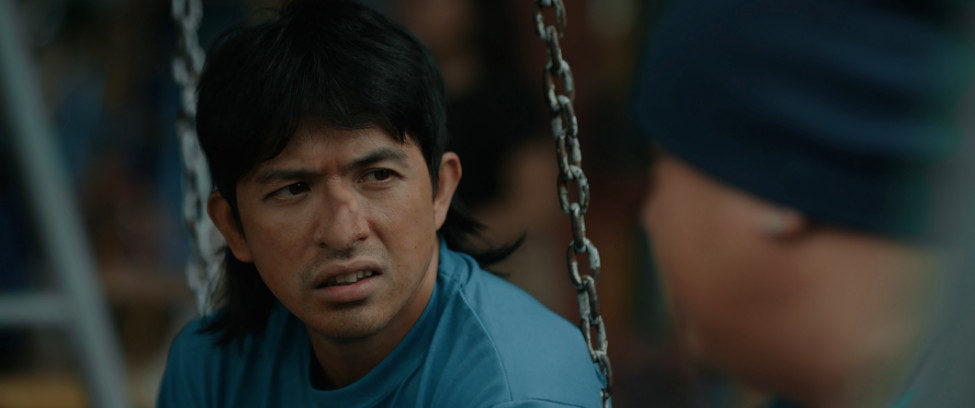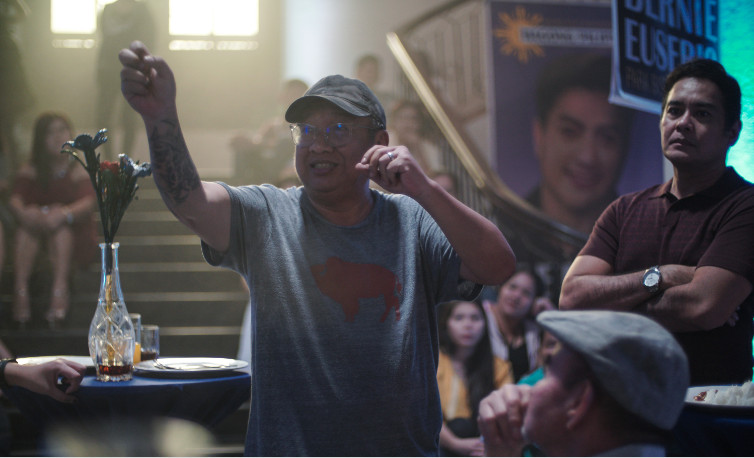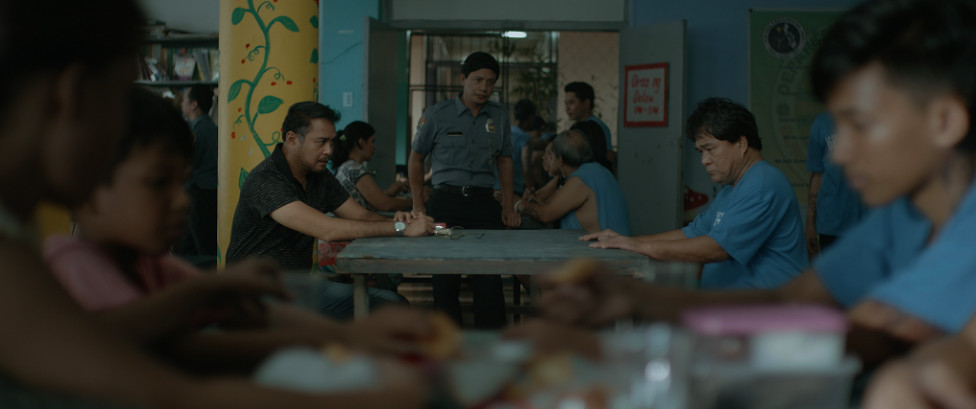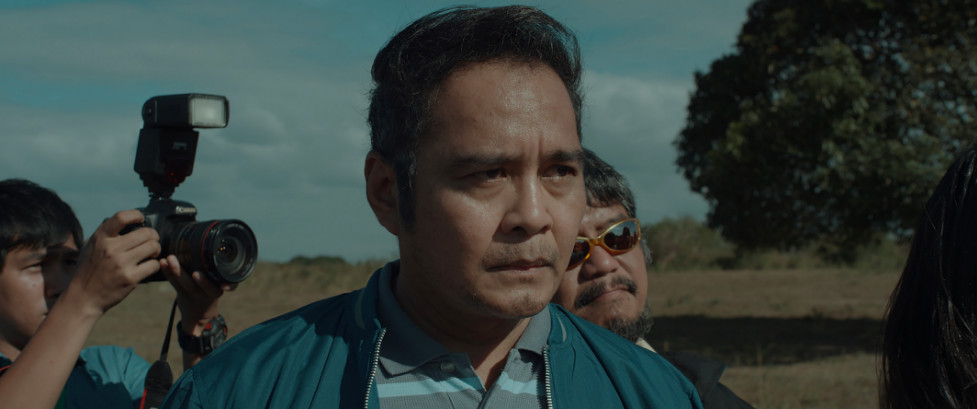
What does John Arcilla has in common with Brad Pitt, Ben Affleck, Adam Driver, and Joaquin Phoenix? They’re all Volpi Cup winners at the Venice Film Festival. The 55-year-old Filipino actor made history by becoming the first Pinoy to win the coveted award for his role as Sisoy Salas in HBO Asia’s “On The Job”.
During his acceptance speech for Best Actor, he said, “We come from different countries with different languages and cultures, and yet I can feel oneness tonight…that you understand me and we understand each other – all because of the arts and cinema. Thank you so much!”
“On the Job: The Missing 8” received a five-minute standing ovation at the event for its take on the real-world predicament regarding fake news and how easily truth can be manipulated and spread to the public in today’s age of information.
Filmed in the Philippines, “On The Job” draws inspiration from real events about prison inmates being temporarily released to carry out political assassinations. Here’s the interesting part – the crime syndicates are run by politicians.
Hitmen prisoners Tatang (Joel Torre), Daniel (Gerald Anderson), and Roman (Dennis Trillo) are occasionally released from jail to perform assassinations ordered by powerful mysterious clients. Meanwhile, law enforcers Joaquin (Joey Marquez) and Francis (Piolo Pascual), and corrupt newspaper reporter Sisoy (John Arcilla) and journalist Arnel (Christopher De Leon) try to uncover the truth behind the killings and disappearances.
John Arcilla dives into his role as the journalist Sisoy in this 6-part original series where he talks about taking on this project, how he relates to it on a personal level, and more. Scroll down to read the interview below:
1. From whom did you draw inspiration from when you act and for your role in “On The Job”?
John Arcilla: When I was younger, most of the senior actors were my favourites. Christopher de Leon and Michael de Mesa, to name a few. In international films, I admire Robert De Niro and Jeremy Irons. But I think they had that influence over me when I was younger. From a student, I then became an actor in a theatre. It’s been a long time since 1990. Around that time, I started to create my own style. The actors that I looked up to were just inspirations for me. When I started creating my own style and perfecting my own craft, I drew inspiration from the characters that I was supposed to play, rather than other actors. I’m not really into the idea of idolising people anymore. I used them for inspiration when I was young, yes. But as I was beginning to learn my craft, I started to rely on the stories to give me inspiration. Often, I looked at the messages that such stories sought to convey to the audience. I always aim to be original. I don’t want to copy anyone and personally, I prefer not to repeat myself. I just study the character that I’ll be portraying and naturally, it’ll come out different from other characters that I’ve acted before. For “On The Job”, it’s more about my interest towards Erik Matti’s works. My character, Sisoy, inspired me.
2. Your character, Sisoy, actually does a lot of things to survive and protect the people that he loves. What are your thoughts about Sisoy?
John Arcilla: One good thing about Sisoy is that he’s a very practical guy. I’d say he’s an above-average guy as well, and he’s intelligent. But, he isn’t intellectual. Supposedly, Sisoy is just an ordinary guy and a person from the provinces. He has better connections and he’s more into himself, so I guess these things place him above the rest. He’s a popular radio anchor in a province. He isn’t intellectual by any means, but he is a street smart person. As Sisoy goes through his daily routines, he’s discovering new things – and he’s willing to do it continuously. He’s willing to abide by the standards that people know him for – an advocate of free press, truth and honesty. When he uncovers the corruption that’s happening right beneath his nose, he doesn’t hesitate to achieve his objective while at the same time, maintaining his standards. Sisoy is a person who seeks the truth. He even has to confront his mentor, but such a thing doesn’t stop him. Such is his determination in pursuing the standards that have guided him since he started out as an anchor. I guess after this particular story, he will still evolve to become a different man. The film ends before that happens, though. Sisoy is ultimately a character in development.

3. How do you feel about working with Dennis Trillo and Erik Matti on this movie? Both you and Dennis hold very important roles in “On The Job”. Do you have any interesting stories to share with us about your working experience?
John Arcilla: With regards to Dennis’s work, I’ve seen him in one film when we were younger. He was young then, and I saw his work. That was the first time his acting won him an award. From then on, I’ve been following his career. When I was notified of Dennis being in “On The Job” with me, I felt like it was a good opportunity. It gave me the chance to work with one of the best actors in the Philippines. The funny thing is, both of our characters only saw each other in the last frame of the film. Our characters’ stories were unfolding separately for most of the film. As an actor, when I get to work with a peer whose work I’m very familiar with, I feel proud. I am still very proud that I’m working with one of the best actors around, even though we don’t appear in a lot of scenes together.
With regard to the director, Erik Matti, this is actually my fourth film with him. It’s always an experience to work with him because his scripts, his style and the way he operates is very challenging – in a very positive way. As an actor, when I work with Erik Matti, I get to utilise everything. From the physical to the mental, to the emotional, and even cerebral aspects as an actor. His scripts always require those things. One thing about Erik and I is that we understand each other even if we don’t communicate frequently. He will give me a set of instructions and I will understand it immediately. I like the way he thinks and the way he operates. The challenge, for me, lies in the physical aspects. When it comes to the emotional or psychological parts of every project, it’s expected of an actor to do it well. When you work with great directors like Erik Matti, you should be prepared, as an actor, to maximise the usage of all your resources. He gave me a good venue to practice utilising my resources. I am very happy to work with him. I hope that Dennis and I will have the chance to do more films together after this one.

4. You tend to add some action and class to your scenes. Does the director kind of let you do what you want to? Like some kind of improvisation?
John Arcilla: I’m not sure how Erik Matti works with other actors but for me, he’ll just let me be. Sometimes he’ll instruct me to add more of something when I’m acting, and at other times he’ll tell me that it’s just right. We’ve never had a problem when it came to the execution of a sequence or scene. This isn’t really one of those intense action films. In the movie, I’m just an ordinary guy who was pushed to fight. There aren’t any sequences where I’m required to act or move like an action-star. I don’t have to do any scenes that require calisthenics or intricate stunts. My character is an ordinary guy who is forced into action, even though he isn’t inclined to take up arms. Hence, it is important to ensure that any sort of action has to be natural for a guy like my character. Even when Erik Matti is already satisfied with what you did – be it 3 takes or whatever – he will always say that it’s beautiful. That way, you will be more inspired to act. On the last day, when he’s fine with all the scenes, he will ask you to do something different. Whatever you want. He will try to see if there’s any more magic that he can extract from production. It’s fun and really nice.
5. “On The Job” is full of action, but how are the downtimes like behind the scenes? Do you guys have fun?
John Arcilla: For me, the fun falls on the work side. If I have delivered the performance the way I want, and if I have successfully worked with my co-actors the way that I want, then it’s fun for me. That’s what fun is for me. It’s fun because I love Erik Matti so much, he’s like a younger brother to me. He’s also like my mentor and my teacher at the same time. We’re like chums and he’s also my peer, but sometimes he can be my principal. He’s everything. Sometimes he can be singing when we’re preparing for our scenes. It’s all fine, and sometimes he’ll talk about what he expects out of you, that’s it. It’s fun working with Erik Matti. He loves food, and I love food. Every time I want to have food, I will just go to his tent and ask if I can have something. He’ll just say yes. Everyday there’s something new, and there’s never a dull moment. I’ve done four films with him but there’s something different every single time. He composes his scenes differently from others. For me, his interpretation of each scene differs from a particular sequence, movie or genre. He plays around with everything, and he’s always out and about with so much energy. That’s a fun thing that I’ve experienced with all his productions.

6. People were questioning the idea behind the show and whether the situation was fictitious when it was being made. What are your takes on the show’s perspective and how it speaks of the current situation in the Philippines?
John Arcilla: When it comes to perspective, from a cinematic point of view, it is really something current and something new. But this story is not unique – it’s not even unique in the Philippines. It’s happening to several societies. It then depends on how gritty and sophisticated it was made – the crime that was committed by the culprits, by the powerful people. It’s been happening for so long. Cinematically speaking, in the filmmaker’s point of view of the Philippines, it’s something “refreshing”. I’m not sure if it’s the right term, but there’s an honesty there. In mainstream cinema, you cannot just say something about it from the point of view of what Erik Matti filmed back then. Sometimes, we romanticise things – as if something’s happening because there’s a bad guy or because there’s a good guy. It’s as if there are no other layers involved. But this time, it is outright and obvious that the crime that is happening here is just a micro version of what is happening on a larger scale in society. In that sense, it is something new to the Filipino film industry. I sincerely wish that it is something new to the global audience as well.
7. In light of the movie being reflective of the issues being faced by Filipinos and Filipino society, how do you think it’s going to be received by the rest of the world?
John Arcilla: I think it’s about the storytelling. From the point of view of the director’s storytelling, it’s refreshing, or something different for the audience. It’s the first time that we are going to find out what the reception will be like, after the premiere in Venice Film Festival. We shall see how the global audience takes it. Whether it’s something new or refreshing, aside from being powerful. Like what you and I have agreed on, this is not something new. It is happening in most societies, at different levels. It may be done in sophisticated or gritty ways, but it’s definitely happening. It’s more about the storytelling aspect, like I’ve said. We Filipinos might see the movie through a different lens because it’s about us. Storytelling is also dependent on the perspectives of the viewers from other countries. We will find out how it goes when it hits theatres and HBO GO.
8. How did you feel about “On The Job” not being released in the cinema?
John Arcilla: I think that the current generation is not so problematic in regard to this matter. I think that the audience are so used to it already, especially the millennials and Gen-Z’s. I think it’s nice to watch the movie on the big screen in one shot, with no cuts, commercials or stoppages. However, I think that our audience nowadays are ready for that. I was so excited to see the whole thing as a film, and I am so excited to see it as a series.

9. What advice would Sisoy (John’s character) give to journalists who find themselves in the same situation?
John Arcilla: There are four kinds of journalists that the culprit in the film enumerated. It is this half-entertainer, half-honest and half-businessman…something like that. I think it’s on us. I think as journalists, we need to examine our own thoughts and feelings every now and then. Sisoy is a guy from the outskirts, from a small town. He’s not actually a city boy. So, he has a kind of idea that “this man is my saviour”, rather than looking at the whole picture and thinking that the same guy could also be the culprit. I think as journalists, we always need to self-reflect and ask ourselves who we serve. Are we serving a certain individual, or are we serving society and the people? This is a very delicate issue. If we are serving the people, are we sensationalising things just to grab everyone’s attention? Whether we like it or not, that will also affect the truth of any crime or incident. At the same time, we need sensationalism because there is competition in the journalism industry. That’s the crisis that is happening right now. That is my personal observation regarding people who work in the media these days. It is the line between serving the business and serving the truth. Competition will always exist and for the sake of attention, we sometimes sensationalise things. We have to ask ourselves how far we will go to regulate ourselves as journalists. We have to think and talk about it as people who work in the media. There’s a very real danger. I’m a student of Mass Communications, and an important rule we learn is self-regulation. If we don’t do that, we might lose our objective. Sensationalism can change the angle of the truth and we need to think about this as journalists.
10. The show can be depressing at times, given the docu-drama or documentary feel that it possesses. Do you think that the movie or the series has a message of hope at the end?
John Arcilla: I think for me, the ending speaks of hope when Dennis’s character said “I want to go home” – which means “I want to stop all of this, I want to be free from all of this.” When my character ran after that meeting, there’s an air of mystery as to what will happen next. I think that there’s a glimpse of hope. It’s as if someone’s trying to say, “Let’s fight this, let’s do this together.” I knew that something was going to happen next. I think if that doesn’t suffice as a hopeful ending, it at least leaves the audience with an air of “what will you do now?”.
“On The Job” is available on HBO GO.
The post Interview: John Arcilla On Working With Erik Matti For “On The Job” appeared first on Hype Malaysia.
0 Comments